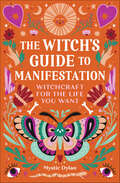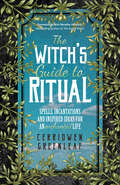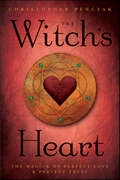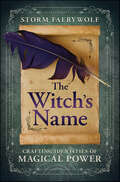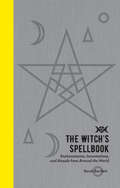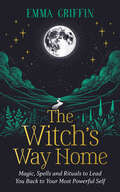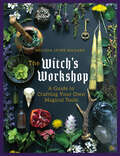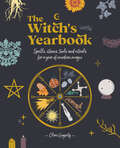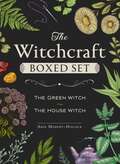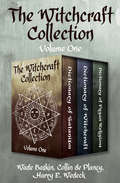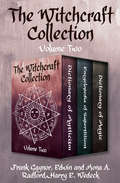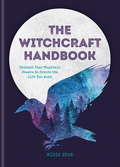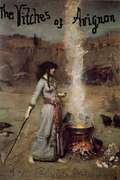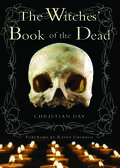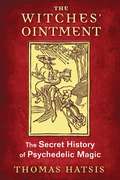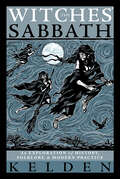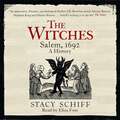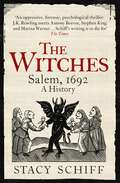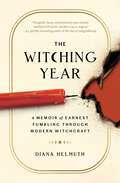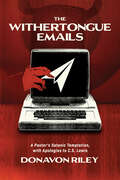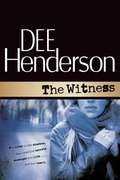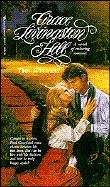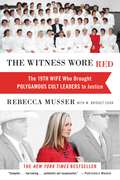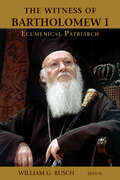- Table View
- List View
The Witch's Guide to Manifestation: Witchcraft for the Life You Want
by Mystic DylanHarness the power of magical manifestation to live the life you desire Manifestation is about directing energy to achieve specific outcomes—and pairing it with magic lends you additional power to fuel your intentions. Learn how to combine magic and manifestation to get what you want from your life, with The Witch's Guide to Manifestation. It's full of insight, instructions, and spells that help you tap into self-awareness and self-love to achieve your deepest desires, no matter how big or small.Demystify manifestation—Explore what manifestation is, how to accomplish it, and how to use it alongside witchcraft to transform your life.Focus on self-discovery—Dive deep into your own internal world, find your most magical self, and manifest the changes you want to see.Learn practical spells—Discover how to construct an Elemental Power Charm, cast a Lady of the Lake Leadership Spell, and concoct a Witch's Magic Manifestation Brew—as well as how to customize spells and create your own.Take a magical approach to manifestation with this practical choice in witchcraft books.
The Witch's Guide to Ritual: Spells, Incantations and Inspired Ideas for an Enchanted Life
by Cerridwen GreenleafSpiritual Ceremonies to Enrich Daily LifePractice Sacred Living. Rituals are often performed to acknowledge special, sacred moments of life. When we align ourselves with the rhythms of the earth, we see that every day is sacred. Sacred living is the art of acknowledging the abundance of life and the deep meaning within natural rhythms. The Witch’s Guide to Ritual teaches the practice of daily rituals for self-care and personal growth.The Art of Healing. The Witch’s Guide to Ritual can help you create a healing ritual space, whether you are an experienced hedge witch or a beginner exploring new magical practices. You’ll learn about the history of rites and rituals, mythology for today’s world, and how healing works in a modern witch house.Celebrate life. The key to celebrating the abundance of life lies in the recognition that we are surrounded by all that is magical. Organized by season, The Witch’s Guide to Ritual offers a suggested ceremony for each day of the year and includes hundreds of simple rites, suggestions, meditations, and holiday celebrations that can make the ordinary extraordinary.What you'll learn inside this book:The psychological benefits of rituals in your lifeWhy participating in group events enriches your life and brings you closer to friends, family, and loved onesHow to create an altar or shrine as a power center in your home for spiritual renewalWhich crystals, herbs, symbols, and talismans can bring you calm, health, love, prosperity, and happinessHealing is possible with sacred living. If you enjoyed The Witch’s Book of Self-Care, The Spirit Almanac, The House Witch, or The Witch’s Book of Rituals, you’ll love this new guide to inspired magical practice.
The Witch's Heart: The Magick of Perfect Love & Perfect Trust
by Christopher PenczakCreate a balanced, happy love life with the help of this book of practical love magick. Award-winning author Christopher Penczak offers a wealth of magickal workings and wisdom for everything from reclaiming sexual power and arousing passion to banishing ties to an unrequited love relationship.Written for Witches, Pagans, and other magickal people, this guide tells you how to first build self-love and self-esteem, then use that energy to find a partner or rekindle the passion in your current relationship. It offers instruction on making love spells, potions, and talismans, and features a materia magica of flowers, herbs, stones, and metals to empower them. The Witch's Heart also explores divine inner alchemy, love deities, sexual healing, fertility, the ethics of love magick, twin flames and soul mates, and how to heal a broken heart.
The Witch's Name: Crafting Identities of Magical Power
by Storm FaerywolfCreate a Magical Identity that Resonates Deeply with Your SoulThe magical name is one of the most powerful tools in Witchcraft. Each time you use it, a spell is cast that empowers and protects you while also helping you transform into the Witch you've always wanted to be. Not just another book of monikers, this thoughtful resource will help you understand the history and mythology of spiritual names according to various cultures. Explore your strengths and reveal deeper layers of your true self with meditations, rituals, journaling, and other practical exercises. With inspiring ideas for how animals, plants, astrology, and tarot can help you form your magical persona, Storm Faerywolf provides clear steps for choosing and claiming the right name. You'll also enjoy wise words from well-known contributors like Mat Auryn, Phoenix LeFae, Gwion Raven, and Laura Tempest Zakroff. You are a unique, magical being. Your Witch name should reflect that.
The Witch's Spellbook: Enchantments, Incantations, and Rituals from Around the World
by Sarah BartlettDiscover how to create magic in your life by working with the cycles of nature to help shape your own future—from the author of The Tarot Bible. The Witch&’s Spellbook is a powerful collection of spells, rituals, and enchantments that you can use to tap into your intuition and the power of the natural world. This book reveals how, by casting spells that align to the cycles of nature and the universe, you can begin to manifest your dreams and shape your destiny. Organized by topic, such as spells for prosperity, charms for body, beauty, and sex, or enchantments for creativity and charisma, each spell draws upon world traditions, sacred holidays, and lunar events such as solstices and equinoxes. Whether you&’re new or experienced, this is every person&’s guide to practical magic.
The Witch's Way Home: Magic, Spells and Rituals to Lead You Back to Your Most Powerful Self
by Emma GriffinDiscover your authentic self and unleash the powerful witch within. This book is your guide to navigating a magical life.It&’s easy to lose your way, but The Witch&’s Way Home will help you to reconnect with your heart so that you can return home to your true self.Modern witch Emma Griffin has created a road map for personal growth, spiritual awakening and living a magical life. In this accessible book of magic, spells and rituals, you will discover:what makes a witch the witch wound and how you can healhow to unlock your magicanimal guides, nature magic and the witch&’s calendarthe power of connecting with the spirit realmshow to raise your vibration to call in your powerThis is not just a spell book but a transformational journey. The Witch&’s Way Home will help you to release any limiting beliefs that hold you back from living a fulfilling life. You will find the courage to delve deep within yourself, confront your fears and finally step into your power.
The Witch's Workshop: A Guide to Crafting Your Own Magical Tools
by Melissa MadaraFrom the author of The Witch's Feast, this is the first fully illustrated, comprehensive introduction to the handicrafts of witchcraft. Through over 60 craft projects, learn all the techniques you need to create your personalized magical toolkit.Empower yourself as a self-sufficient witch, and become a master of the natural arts!This in-depth guide, accompanied by step-by-step images, will show you all the craft and design skills you need to make your own, personalized and fully adaptable magical toolkit.Melissa Madara, magical expert, herbalist and witch, shares 60+ unique projects and techniques, many of which revive spells from the history of witches past. Approachable for beginners and stimulating for established practitioners, the crafts are clearly explained through luscious photographs, detailed research, useful charts, and easy-to-follow instructions. Once you are directly in touch with the power of these crafts, understanding deeply the processes and the associations of magical ingredients, you can be inspired to create all your own unique formulations. Chapters include:Incense, including kyphi temple incense, which once billowed from the temples of ancient Egypt, to house blessing incense for cleansing any new home.Inks, including dragon's blood ink and botanical drawing charcoals.Oils, such as flying ointment or the world's first known chemist Tapputi's royal salve.Natural dyes for creating stunning eco-printed ritual gowns or a spring equinox altar tablecloth.Papers, like Japanese knotweed paper or autumn equinox corn husk paper.Powders essential for rituals and spells such as scrying powder and banishing salt.Candles of all shapes and types, including poured, dipped and molded.With all of this knowledge, you can create altars, rituals and spells that are highly specific, personal and in touch with your natural environment.
The Witch's Yearbook: Spells, Stones, Tools and Rituals for a Year of Modern Magic
by Clare GogertyCelebrate the Wheel of the Year—from Samhain to Mabon—with remedies, charms, crystals, and DIY crafts that connect you with sabbat traditions and customs.This book will guide you through a year of magic. Based on the cycles of nature and guided by the seasons, it will give you the tools and know-how to unveil the magic that surrounds us. By celebrating the eight sabbats of the Wheel of the Year, you will work with nature to activate your hidden power and trigger miraculous happenings. Witchcraft can attract love, give your career a boost, protect your home and help with healing. It will enrich your life.Packed with information and inspiration, this book boosts well-being, self-worth and happiness by tapping into the healing power of nature, the cycle of the seasons, the pull of the moon, the wisdom of ancient trees and forgotten paths, and the spiritual rewards of creativity. It includes:Seasonal spells, remedies, rituals and affirmations that use the power of plants, herbs and stones to offer guidance and healing.Features including crystal gazing, dowsing, reading the Tarot, the magic of stone circles and folklore traditions, to increase knowledge and inspire curiosity.Creative projects with a witchy purpose that can be used in rituals and spells.Whether you are a solitary hedge witch, part of a coven, a practicing witch or an aspiring one, this book will furnish you with the vital knowledge to enrich your journey and to sprinkle magic and enchantment over every day.
The Witchcraft Boxed Set: Featuring The Green Witch and The House Witch
by Arin Murphy-HiscockA Simon & Schuster eBook. Simon & Schuster has a great book for every reader.
The Witchcraft Collection Volume One: Dictionary of Satanism, Dictionary of Witchcraft, and Dictionary of Pagan Religions
by Wade Baskin Harry E. Wedeck Collin de PlancyThree authoritative yet accessible reference books explaining the terms, concepts, histories, and significant personalities of occult systems and practices.Dictionary of Satanism is a concise yet wide-ranging reference guide for the casual reader. It features essential information on the important concepts, issues, people, places, and events associated with Satanism. Also covered are the myriad forms and names that satanic worship has taken from ancient times to the present. Following its original publication in 1818, Collin de Plancy&’s Dictionary of Witchcraft became a landmark study of demonology and the occult. A significant influence on the Romantic literary movement and notably consulted by author Victor Hugo, de Plancy&’s work remains an essential reference text for any student of the dark arts. Dictionary of Pagan Religions offers a wide-ranging survey of the many religious cults that have flourished around the world from the Stone Age to the present. From Egyptian to Celtic traditions and Gnosticism to Cabala, coauthors Harry E. Wedeck and Wade Baskin have compiled information about the rites, rituals, and influences of these religious systems.
The Witchcraft Collection Volume Two: Dictionary of Mysticism, Encyclopedia of Superstitions, and Dictionary of Magic
by Frank Gaynor Edwin Radford Harry E. Wedeck Mona A. RadfordThree authoritative yet accessible reference books covering the esoteric terms, concepts, and histories of magical practices and mystical thought. Dictionary of Mysticism offers concise definitions for more than 2,200 terms used in a number of mystical traditions and fields of study, including esoteric philosophy, occultism, psychical research, spiritualism, alchemy, astrology, and demonology. It also covers the studies of Buddhism, Brahmanism, Sufism, Lamaism, Zoroastrianism, Theosophy, and Cabbalism. Encyclopedia of Superstitions is a wide-ranging and authoritative reference book that explores the origins and influences of various superstitions from a number of cultural traditions. It contains enlightening information about charms, spells, fairy lore and legend, folk remedies, and customs of birth, marriage, and death. In Dictionary of Magic, occult expert Harry E. Wedeck offers a broad understanding of witchcraft, necromancy, paganism, the occult, and many of magic&’s other manifestations. This A-to-Z reference book provides in-depth information on essential concepts, practices, and vocabulary, and covers many notable wizards and demonographers.
The Witchcraft Handbook: Unleash Your Magickal Powers to Create the Life You Want
by Midia StarEmbrace your inner witch.Packed with spells, potions and witchy wisdom, use this magickal guide to enhance every aspect of your life. From the effects of the moon to the use of candles to enhance spells, learn how to protect your home, fulfill your dreams, boost your love life, banish ill chance and secure your future.Isn't it time you unleashed the power of magick?
The Witchcraft Handbook: Unleash Your Magickal Powers to Create the Life You Want
by Midia StarEmbrace your inner witch.Packed with spells, potions and witchy wisdom, use this magickal guide to enhance every aspect of your life. From the effects of the moon to the use of candles to enhance spells, learn how to protect your home, fulfill your dreams, boost your love life, banish ill chance and secure your future.Isn't it time you unleashed the power of magick?
The Witches Of Avignon
by Ana Bowlova Ana Claudia AntunesHow the witches entered the world of imagery, through the realms of imagination or through images that in fact were already there in the eye of the civilization? How about the Amazons? Were they legends, really? Or did they exist, and perhaps they still do? May you find the answers to some of the most mysterious puzzles of ancient times in this book based upon facts.This is the first book from the trilogy Memoirs of An Amazon:The Witches of Avignon (The Past) The Pierrot's Love (The Present)Out Of The Blue (The Future)
The Witches' Book of the Dead
by Christian DayWitches are creatures of magic. They cast spells, heal, and foretell the future. What you might not know is that Witches can also commune with the spirits of the dead. In The Witches' Book of the Dead, modern-day Salem Warlock Christian Day shows how the spirits of our beloved dead can be summoned to perform such tasks as helping you to discover hidden opportunities, influence the minds of others, seduce the object of your affection, and even reach into the dreams of the unwary. According to legend, the Spirits of the dead can confer magical talents, fame, love, and wealth on those brave enough to summon them. The Witches' Book of the Dead explores the enduring relationship between witches and the dead and teaches rituals and incantations to help readers open doorways to the spirit world. Topics include: Legendary Witches who have raised the dead, including The Witch of Endor, Circe, and Erichtho Creating ancestral altars and building relationships with spirits The tools of Necromancy: the bronze dagger, yew wand, iron keys, graveyard dust, the offering cauldron, spirit powders, the human skull, and more. Methods of spirit contact, including automatic writing, scrying mirrors, spirit boards, pendulums, and spirit mediumship The ancient arts of necromancy as a method of conjuring the dead to assist in magic Ridding yourself of unwanted spirits using rituals of cleansing, banishing and exorcism Ghost hunting techniques that combine psychic wisdom with modern technology Communing with the dead in dreams Sacred holidays and powerful celebrations of the dead Resources on where to ethically obtain the tools of the trade An overview of the feared deities of the Underworld Rituals, recipes, exercises, and more! Dare to walk between the worlds with Christian Day as he guides you across the River Styx into the shadowy realms where the dead long to connect with us once more!
The Witches' Ointment: The Secret History of Psychedelic Magic
by Thomas HatsisAn exploration of the historical origins of the “witches’ ointment” and medieval hallucinogenic drug practices based on the earliest sources • Details how early modern theologians demonized psychedelic folk magic into “witches’ ointments” • Shares dozens of psychoactive formulas and recipes gleaned from rare manuscripts from university collections all over the world as well as the practices and magical incantations necessary for their preparation • Examines the practices of medieval witches like Matteuccia di Francisco, who used hallucinogenic drugs in her love potions and herbal preparations In the medieval period preparations with hallucinogenic herbs were part of the practice of veneficium, or poison magic. This collection of magical arts used poisons, herbs, and rituals to bewitch, heal, prophesy, infect, and murder. In the form of psyche-magical ointments, poison magic could trigger powerful hallucinations and surrealistic dreams that enabled direct experience of the Divine. Smeared on the skin, these entheogenic ointments were said to enable witches to commune with various local goddesses, bastardized by the Church as trips to the Sabbat--clandestine meetings with Satan to learn magic and participate in demonic orgies. Examining trial records and the pharmacopoeia of witches, alchemists, folk healers, and heretics of the 15th century, Thomas Hatsis details how a range of ideas from folk drugs to ecclesiastical fears over medicine women merged to form the classical “witch” stereotype and what history has called the “witches’ ointment.” He shares dozens of psychoactive formulas and recipes gleaned from rare manuscripts from university collections from all over the world as well as the practices and magical incantations necessary for their preparation. He explores the connections between witches’ ointments and spells for shape shifting, spirit travel, and bewitching magic. He examines the practices of some Renaissance magicians, who inhaled powerful drugs to communicate with spirits, and of Italian folk-witches, such as Matteuccia di Francisco, who used hallucinogenic drugs in her love potions and herbal preparations, and Finicella, who used drug ointments to imagine herself transformed into a cat. Exploring the untold history of the witches’ ointment and medieval hallucinogen use, Hatsis reveals how the Church transformed folk drug practices, specifically entheogenic ones, into satanic experiences.
The Witches' Sabbath: An Exploration of History, Folklore & Modern Practice
by KeldenDiscover the Hidden Depths of the SabbathTake flight for a mesmerizing exploration of an event long shrouded in fear and mystery—the Witches' Sabbath. Kelden presents an in-depth examination of the Sabbath's historical and folkloric development as well as its re-emergence within the modern practice of Witchcraft. From discussions on the folklore of flight and the events of nocturnal gatherings to enchanting rituals and recipes, you'll find everything you need to not only understand the nature of the legendary Sabbath, but also journey there yourself. Offering impressive research and compelling stories from across Europe and the early American colonies, this book is the ultimate resource for discovering an oft misunderstood and overlooked aspect of Witchcraft.Includes a foreword by Jason Mankey, author of The Horned God of the Witches
The Witches: Salem, 1692
by Stacy SchiffIt began in 1692, over an exceptionally raw Massachusetts winter, when a minister's daughter started to scream and convulse. It ended less than a year later, but not before nineteen men and women had been hanged and an elderly man crushed to death. The panic spread quickly, involving the most educated men and prominent politicians in the colony. Neighbours accused neighbours, parents accused children, husbands accused wives, children accused their parents, and siblings each other. Vividly capturing the dark, unsettled atmosphere of seventeenth-century America, Stacy Schiff's magisterial history draws us into this anxious time. She shows us how a band of adolescent girls brought the nascent colony to its knees, and how quickly the epidemic of accusations, trials, and executions span out of control. Above all, Schiff's astonishing research reveals details and complexity that few other historians have seen. Every detail of colonial life just decades after the first landing - family, farming, praying, housekeeping, dangers of life at wilderness's edge, estrangement from England, the pressures of a life dominated by Biblical thought - is rendered with a clarity that makes almost inconceivable events comprehensible. As psychologically thrilling as it is historically seminal, as magnificently written as it is deeply researched, THE WITCHES breathes new life into one of history's most enduring mysteries.Read by Eliza Foss(p) 2015 Hachette Audio
The Witches: Salem, 1692: A History
by Stacy Schiff'An oppressive, forensic, psychological thriller: J.K. Rowling meets Antony Beevor, Stephen King and Marina Warner ... Schiff's writing is to die for' THE TIMESIt began in 1692, over an exceptionally raw Massachusetts winter, when a minister's niece started to scream and convulse. It ended less than a year later, but not before panic had infected the entire colony, nineteen men and women had been hanged, and a band of adolescent girls had brought Massachusetts to its knees.Vividly capturing the dark, unsettled atmosphere of seventeenth-century America, Stacy Schiff's magisterial history draws us into this anxious time. She shows us how quickly the epidemic of accusations, trials, and executions span out of control. Above all, Schiff's astonishing research reveals details and complexity that few other historians have seen.
The Witching Year: A Memoir of Earnest Fumbling Through Modern Witchcraft
by Diana HelmuthA skeptic spends a year trying to find spiritual fulfillment by practicing modern Witchcraft in this fascinating memoir that&’s perfect for fans of A.J. Jacobs and Mary Roach.Diana Helmuth, thirty-three, is skeptical of organized religion. She is also skeptical of disorganized religion. But, more than anything, she is tired of God being dead. So, she decides to try on the fastest-growing, self-directed faith in America: Witchcraft. The result is 366 days of observation, trial, error, wit, and back spasms. Witches today are often presented as confident and finished, proud and powerful. Diana is eager to join them. She wants to follow all the rules, memorize all the incantations, and read all the liturgy. But there&’s one glaring problem: no Witch can agree on what the right rules, liturgy, and incantations are. As with life, Diana must define the craft for herself, looking past the fashionable and figuring out how to define the real. Along the way, she travels to Salem and Edinburgh (two very Crafty hubs) and attends a week-long (clothing optional) Witch camp in Northern California. Whether she&’s trying to perform a full moon ritual on a cardboard box, summon an ancient demon with scotch tape and a kitchen trivet, or just trying to become a calmer, happier person, her biggest question remains: Will any of this really work? The Witching Year is a &“compelling memoir&” (Frances Denny, author of Major Arcana) that follows in the footsteps of celebrated memoirs by journalists like A.J. Jacobs, Mary Roach, and Caitlin Doughty, who knit humor and reportage together in search of something worth believing.
The Withertongue Emails: A Pastor's Satanic Temptation, with Apologies to C.S. Lewis
by Donavon RileyInspired by C.S. Lewis' classic work, The Screwtape Letters, The Withertongue Emails encourage readers in the twenty-first century to take seriously once again the dangers of ignoring the demonic and assuming that, because we are Christians, we cannot be tempted into sin and unbelief. In this work, Donavon Riley leads the reader through a young pastor's demonic temptation, seeming downfall, and final conversion to faith in Christ Jesus alone for his redemption and salvation.
The Witness
by Dee HendersonPolice Chief Luke Granger's witness to a murder, Amy Griffin, has been on the run for years. Her two sisters think she was murdered eight years ago. But Amy chose to accept a life in the shadows to protect her sisters' lives. Now unveiled secrets about their father have thrust the sisters into the public spotlight. The man who wants Amy dead now sees her sisters as the way to locate her. Luke and two of his homicide detectives are determined to stand in the way. They are each falling in love with a different sister, and it's become a personal mission to keep them safe. But chances are that at least one of them will fail....And facing the future will take a faith deeper than any of them currently knows.
The Witness (Grace Livingston Hill #75)
by Grace Livingston HillHandsome and brilliant, Paul Courtland seemed destined to live a life filled with only the best. And now he had even more to look forward to, for the beautiful Gila Dare had agreed to marry him! Then Paul witnessed the fiery death of a fellow student who sacrificed himself in an attempt to save others. From that moment, Paul’s life began to change, and he could not deny his awareness of Christ’s presence--and of a new purpose this Christ was bringing to his life: to help the poor and troubled. But his adored Gila saw no place in her well-planned life for such work, and so she gave him a choice: give up his work or she was out of his life. So now Paul Courtland must make a choice--but can he live with his decision and ever be truly happy again? Grace Livingston Hill is the beloved author of more than 100 books. Her wholesome stories contain adventure, romance, and the heartwarming triumphs of people faced with the problems of life and love. Look in the Bookshare collection for over 65 books by Grace Livingston Hill including: #60 Miranda, #61 Mystery Flowers, #66 The Girl From Montana, #67 A Daily Rate, #68 The Story of a Whim, #69 According to the Pattern, #70 In The Way, #71 Exit Betty, #72 The White Lady, #73 Not Under The Law, #74 Lo Michael, #75 The City of Fire, #77 The Ransom, #78 Found Treasure, #81 Duskin, #82 The White Flower, #84 Cloudy Jewel and #85 Crimson Mountain
The Witness Wore Red: The 19th Wife Who Brought Polygamous Cult Leaders to Justice
by Rebecca Musser M. Bridget CookRebecca Musser grew up in fear, concealing her family's polygamous lifestyle from the "dangerous" outside world. Covered head-to-toe in strict, modest clothing, she received a rigorous education at Alta Academy, the Fundamentalist Church of Jesus Christ of Latter Day Saints' school headed by Warren Jeffs. Always seeking to be an obedient Priesthood girl, in her teens she became the nineteenth wife of her people's prophet: 85-year-old Rulon Jeffs, Warren's father. Finally sickened by the abuse she suffered and saw around her, she pulled off a daring escape and sought to build a new life and family. The church, however, had a way of pulling her back in-and by 2007, Rebecca had no choice but to take the witness stand against the new prophet of the FLDS in order to protect her little sisters and other young girls from being forced to marry at shockingly young ages. The following year, Rebecca and the rest of the world watched as a team of Texas Rangers raided the Yearning for Zion Ranch, a stronghold of the FLDS. Rebecca's subsequent testimony would reveal the horrific secrets taking place behind closed doors of the temple, sending their leaders to prison for years, and Warren Jeffs for life. THE WITNESS WORE RED is a gripping account of one woman's struggle to escape the perverse embrace of religious fanaticism and sexual slavery, and a courageous story of hope and transformation.
The Witness of Bartholomew I, Ecumenical Patriarch
by William G. RuschIn this volume several theologians from different Christian traditions examine how Bartholomew I as Ecumenical Patriarch has influenced the contemporary European scene, the various dialogues between Orthodox churches and Reformed and Roman Catholic churches, the ongoing work of the World Council of Churches, and the modern ecumenical movement.These essays, largely from non-Orthodox authors, paint a portrait of the Ecumenical Patriarch that has been often overlooked in Western circles -- as a deeply Orthodox leader who wishes to relate Orthodoxy to the modern world and to have it make its contribution to the unity of Christians.Contributors:Anna Marie AagaardPeter C. BouteneffGünther GassmannDale T. IrvinRonald G. Roberson, CSPWilliam G. RuschJoseph D. SmallMary Tanner
